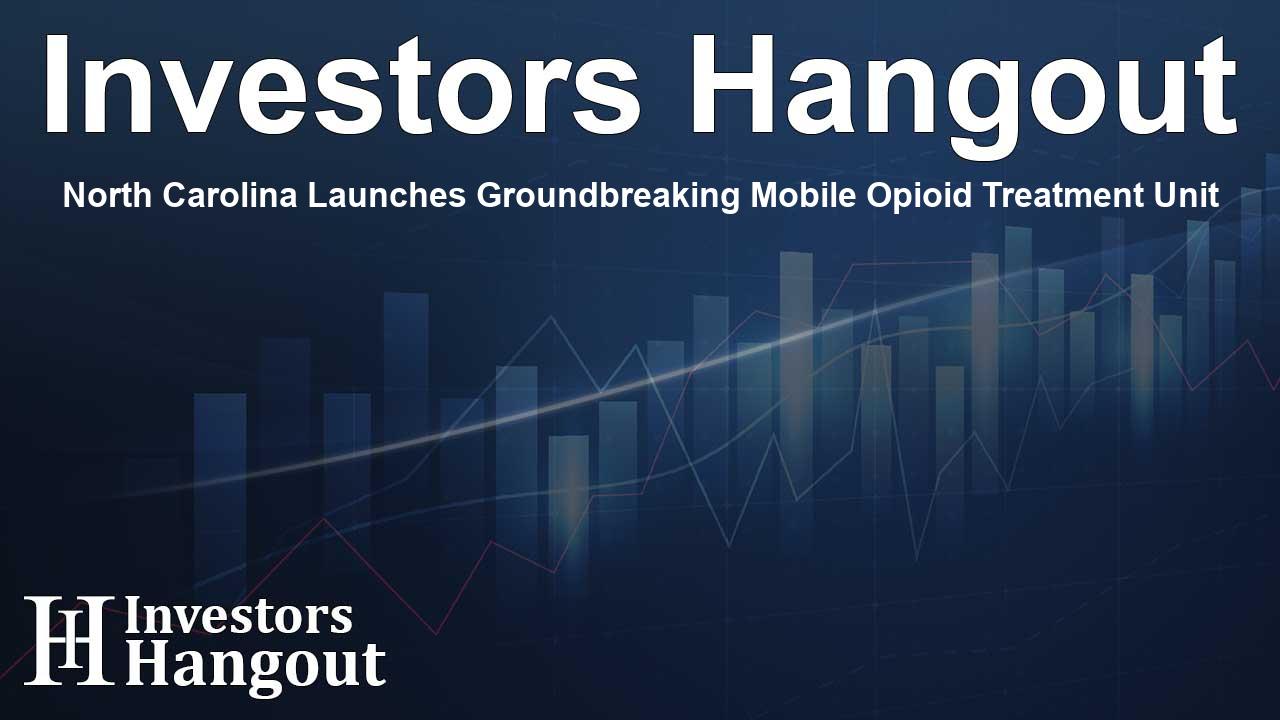North Carolina Launches Groundbreaking Mobile Opioid Treatment Unit

Innovative Step Towards Opioid Treatment in North Carolina
In an exciting advancement for public health, North Carolina has recently unveiled its first Mobile Opioid Treatment Program (OTP), marking a significant milestone in the ongoing battle against opioid addiction. The initiative was celebrated in a lively ceremony led by First Lady Anna Stein, alongside Kelly Crosbie from the NC Department of Health and Human Services and Dr. Eric Morse, the visionary behind Morse Clinics.
Understanding Opioid Treatment Programs
Opioid Treatment Programs are vital resources that deliver comprehensive care, including Medications for Opioid Use Disorder (MOUD), essential counseling, and peer support. These programs are uniquely equipped to provide all FDA-approved medications, positioning MOUD as the gold standard for individuals battling opioid addiction.
Empowering Communities in Recovery
North Carolina First Lady Anna Stein emphasized the importance of making recovery resources accessible, stating, "Mobile OTPs will make it easier for people to begin their recovery journey within their own communities." This commitment to accessibility is essential, as research indicates that individuals engaged in OTPs experience enhanced survival rates and sustained recovery.
Progress in Treatment Accessibility
The demand for OTP services has surged in recent years, with a reported 25% increase in participants since 2019. In 2024 alone, OTPs supported over 31,000 individuals, with projections indicating further growth in 2025. Dev Sangvai, Secretary of NC Health and Human Services, affirmed the state's commitment to facilitating recovery through this innovative mobile unit.
Features of the Mobile Unit
The newly launched mobile unit, sponsored by Morse Clinics, serves as an extension of traditional treatment facilities. By bringing essential healthcare services directly to individuals in 13 counties, including Wake and Durham, those in need will have improved access to life-saving medications and support.
Convenient Access to Treatment
Dr. Eric Morse expressed the significance of the mobile unit, stating, "This initiative not only highlights our mission to meet individuals where they are but also enhances their access to crucial treatment options." The unit alleviates the stress of attending a physical location, thereby allowing patients to continue their treatment seamlessly.
Supporting Vulnerable Populations
Currently stationed at Healing Transitions in Raleigh, the mobile unit aims to assist the unhoused population by providing guest dosing and ensuring consistent access to medications. This strategic location helps bridge gaps in care for individuals facing housing instability or those traveling for various commitments.
Future Plans and Expansion
Looking forward, North Carolina is planning to introduce up to six additional mobile OTPs by year-end, financed through Hurricane Helene relief funds. These units are expected to extend their services to areas lacking comprehensive treatment options.
Addressing Rural Healthcare Challenges
As Kelly Crosbie, NCDHHS Director, highlighted, mobile OTPs are crucial for expanding treatment access in rural regions, where transportation barriers significantly hinder individuals' ability to obtain care. The expansion of these units demonstrates a proactive approach to addressing healthcare disparities.
Expanding the Network of Providers
In addition to Morse Clinics, other providers are working toward the approval and implementation of mobile OTPs across various counties, including private organizations in major cities. This rapid expansion indicates a collective commitment to tackling the opioid crisis.
Conclusion: A Brighter Future with Mobile OTPs
With a total of 96 OTPs available across the state, including physical locations in 55 counties, the introduction of mobile units aims to reach all 100 counties in North Carolina. The initiative sets the stage for an inclusive approach to treatment, emphasizing the importance of accessibility and support for every individual on their journey to recovery.
Frequently Asked Questions
What is a Mobile Opioid Treatment Program?
A Mobile Opioid Treatment Program is a mobile unit designed to deliver medications and supportive services directly to individuals battling opioid use disorder.
How does the mobile unit improve treatment access?
By bringing services closer to communities, mobile units reduce barriers like transportation difficulties and stigma associated with seeking treatment.
Which counties will benefit from the new mobile unit?
The mobile unit operated by Morse Clinics will serve counties like Wake, Chatham, and Johnston, among others.
What services are provided by the mobile unit?
The unit provides MOUD, counseling services, and peer support to assist individuals on their recovery journey.
How many more mobile units are being planned?
Up to six additional mobile OTPs may be launched by the end of the year to further enhance access to treatment in underserved regions.
About The Author
Contact Lucas Young privately here. Or send an email with ATTN: Lucas Young as the subject to contact@investorshangout.com.
About Investors Hangout
Investors Hangout is a leading online stock forum for financial discussion and learning, offering a wide range of free tools and resources. It draws in traders of all levels, who exchange market knowledge, investigate trading tactics, and keep an eye on industry developments in real time. Featuring financial articles, stock message boards, quotes, charts, company profiles, and live news updates. Through cooperative learning and a wealth of informational resources, it helps users from novices creating their first portfolios to experts honing their techniques. Join Investors Hangout today: https://investorshangout.com/
The content of this article is based on factual, publicly available information and does not represent legal, financial, or investment advice. Investors Hangout does not offer financial advice, and the author is not a licensed financial advisor. Consult a qualified advisor before making any financial or investment decisions based on this article. This article should not be considered advice to purchase, sell, or hold any securities or other investments. If any of the material provided here is inaccurate, please contact us for corrections.
